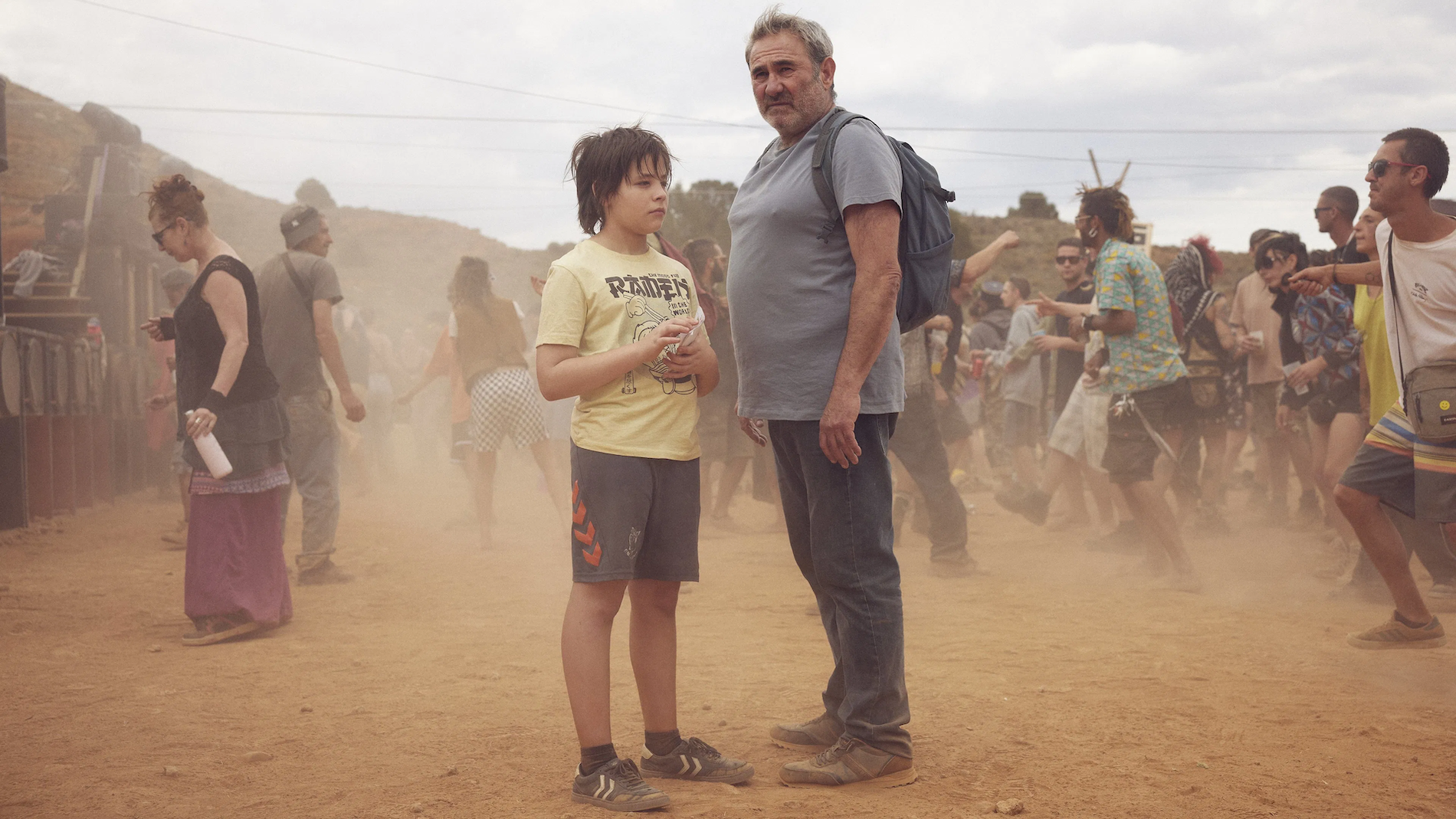Issue
67
Sirāt

- Director:Óliver Laxe|
- Screenwriter:Santiago Fillol, Óliver Laxe|
- Distributor:Neon|
- Year:2025
In Islamic eschatology, the bridge to paradise is “narrower than a strand of hair and sharper than a sword.”
It’s called sirāt, and, depending on how faithfully one lived one’s life, promises either salvation or damnation. Óliver Laxe’s film of the same name concerns a middle-aged father searching for his daughter among ravers in the Sahara, an existential journey that’s both a search party and a danse macabre. There may be nothing new under the sun, but under the harsh rays of the desert, Sirāt looks like few other movies in recent or distant memory.
It opens with a propulsive montage of an outdoor rave with no diegetic sound, just a pulsing, bass-heavy electronic score by composer Kangding Ray that you’ll feel as much as you’ll hear — this is sound as a physical experience that reverberates in your ears and bones alike. Somewhere in the mass of dancing revelers may or may not be the missing person in question, whom Luis (Sergi López) has gone looking for with the assistance of his young son Esteban (Bruno Núñez Arjona) and their dog Pipa.
We never learn what has led our desperate protagonist to this particular bacchanal, and none of the blissed-out attendees have seen her (though so many of them are under the influence that we can’t be sure how reliable they are as eyewitnesses). But a few of them are aware of a second rave deeper in the Sahara, near Morocco’s border with Mauritania, that Luis’ daughter could just as feasibly be attending.
Reaching it won’t be easy. There are vague news reports of war having broken out, and military vehicles arrive on the scene to ensure an orderly departure. When the ravers Luis met earlier make a run for it in their camper van, he follows them into one of the brightest hearts of darkness ever seen at the movies. “Is this what the end of the world feels like?” one of them asks during a particularly fraught moment. Sirāt’s card doesn’t appear onscreen for a full half hour, by which point it has answered that apocalyptic question in the affirmative even before another character does: “It’s been the end of the world for a long time.”
That entire premise, we slowly learn, is something of a MacGuffin — a means of getting the characters from point A to point B, albeit with enough detours and wrong turns along the way to bring to mind the Donner Party. (No cannibalism, thankfully.) To say that the journey matters more than the destination is true in spirit but falsely implies the existence of a true destination, for Sirāt’s band of unwitting pilgrims are fated to wander through the desert and lose far more than they find.
Is this what the end of the world feels like?
Even if I weren’t spoiler-averse when writing about movies, I’m not sure there’d be any way to prepare you for what happens over the course of the film’s bruising two hours. My jaw literally dropped at two different points, so out of nowhere and upsetting were the images onscreen, and yet it never feels as though Laxe is going for shock value or trying to disturb us merely for the sake of being disturbing. Witnessing Luis and his cohort drive deeper and deeper into the Sahara’s vast expanse without seeming to get any closer to the supposed rave site is a bit like watching the doomed teenagers of a slasher movie arrive at a creepy summer camp where they’re to be picked off one by one. The key difference is that Laxe never treats his characters as cannon fodder. He fleshes them out, gives us reason to hope they’ll find what they’re looking for, and sets them down a path of no return.
Anyone who’s seen Henri-Georges Clouzot’s The Wages of Fear or William Friedkin’s Sorcerer will feel their hands getting clammy as the caravan navigates treacherous mountain roads and runs low on gasoline. Laxe keeps Ray’s booming soundtrack in the fore throughout, a discordant mix that keeps us on our toes as we wonder toward what outcome Sirāt could possibly be heading.
López is as sympathetic here as he was villainous in Pan’s Labyrinth, in which he played a Francoist captain responsible for the film’s most brutal scene. Luis couldn’t be more out of place among his grungy new allies, but he’s so desperate to find his daughter that he’d clearly be willing to descend into the depths of hell to do so. He might have to.
